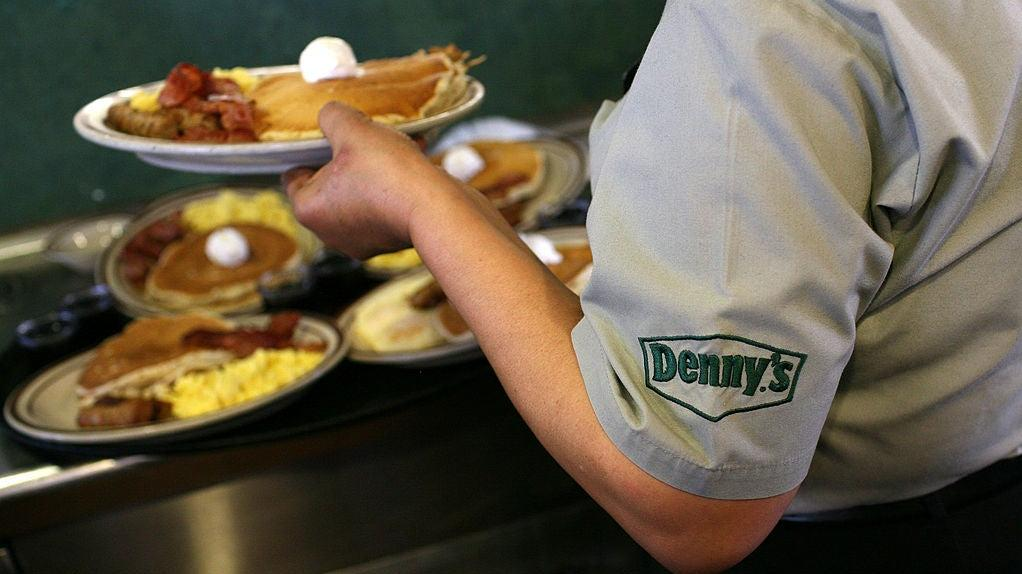Denny's Mental Health Summit Misses The Point
The breakfast chain adds a side of employee counseling to its menu.
I hope you like tossed salads with your scrambled eggs, because this April, Denny's wants to be your Fraiser. Per a recent press release, the nationwide diner giant will be offering a series of employee summits "focused on how companies and individuals can better manage and improve their mental health and wellness." These sessions, the first of which is scheduled to take place April 22, will feature nationally recognized figures such as keynote speaker Dr. Daniel E. Dawes, and will also be open to the public.
"There's no better time than now," said Denny's CEO Kelli Valade, "to focus on our well-being and bringing your most authentic self to the workplace. These summits will bring together our employees, educators, researchers and other experts to hear and learn about mental health resources."
Free seminars with social welfare experts, available to one and all? Sounds like a positive development. So what's wrong with this picture, and why does it make my service-industry lizard brain want to flick out its tongue and hiss?
Why Denny’s wellness offering rings hollow
Let's start with the positives, before that mental iguana bites a hand stretched out in friendship. First, these sessions are free, available online or in person, and as far as I can tell they're non-compulsory for employees. My issues with Denny's mental health summit have nothing to do with the chosen speakers, either. According to some cursory research, in fact, I'd say the lineup is solid. These folks appear to care about social well-being, as evidenced by their work and reputation.
But let's go back to the words of Denny's own PR team, which acknowledges that "the post-pandemic period has ignited an increase in loneliness and mental illness. A 2021 American Psychological Association survey revealed that nearly 3 in 5 employees (59%) said they have experienced negative impacts of work-related stress in the past month, and a vast majority (87%) of employees think actions from their employer would help their mental health."
Are... are you kidding me? You needed a survey to sort that out? But behind the obviousness of the point lies what Denny's believes is the solution: Employees believe that, by acting on workers' concerns, a business can elevate the mental wellness of its workforce.
Now, let's think about what an employer could offer that would immediately boost morale. I don't know about you all, but the thought of attending a 4.5-hour lecture (with a sequel coming in October) only fills me with additional dread. As a food service worker, I believe the quickest way to improve my mental health is simple: Put a few extra dollars in my pocket.
Money doesn’t by happiness, but it can rent peace of mind
Poor hours, short staffing, and increased cost of living are among the prime stressors for customer service workers, and no amount of "Thank You" cards, corporate-branded merch, or (shudder) company pizza parties will ease the pressure. Higher pay helps address each of the primary concerns. Yet all too often, it feels like companies will do anything but offer their employees a financial boost.
For the record, I'm not talking about small businesses here, like food trucks or places with only a location or two. That's an entirely separate economic sector that comes with its own challenges for both employees and employers. But Denny's isn't a small business. It's a nationwide chain that, for the record, saw its revenue increase 15% from 2021 to 2022 and beat analysts' Earnings Per Share (EPS) projections by 5.3%. Sure, its net income and profit margin dropped by around 4% apiece, but the consensus seems to be clear: The Moons Over My Hammy platter isn't going anywhere.
"Hold on, Mr. Skillet Socialist," you might say, "These wellness sessions are one-time events with a fixed budget. Raising wages across the board would be a larger, more long-term expense." Correct! But a round of bonuses, say, doled out to those same employees that Denny's hopes to draw to its summits, is also a one-time cost, and not exactly an unprecedented one.
Motivational meetings aren’t what service workers want
For what it's worth, the food service vets I spoke with (though none were Denny's employees) echoed the sentiments above. The thought of devoting a precious morning off to sit through a mental wellness seminar produced a universal answer: "Thanks, but no thanks."
"It feels like they [Denny's] think they're doing the right thing," said one longtime food service worker, "or what they think they're supposed to do. But a CEO doesn't know what a waitress has to face. They're not down here, on this level. If they want to put you in touch with a doctor or set something up, great. But not as a one-time thing."
This is a key point: Providing access, either through health insurance or employee outreach programs, is laudable. It's also a separate issue from limited seminars.
In an effort to make the distinction, I also floated the idea past a longtime counselor. "Sometimes," he said, "mental health comes down to just getting paid better. One hundred percent."
There's nothing inherently wrong with Denny's mental health summits, and the intentions appear to be good. But if the goal is to elevate employees' happiness, these sessions run the risk of stepping around the problem by telling beleaguered servers and cooks what they need to change, and what they're doing wrong—a potential outcome that's as bitter as Denny's drip coffee.
